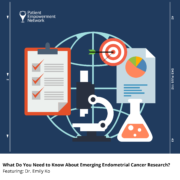How Can Gynecologic Oncology Racial Disparities Be Addressed?
How Can Gynecologic Oncology Racial Disparities Be Addressed? from Patient Empowerment Network on Vimeo.
What are some ways that gynecologic oncology racial disparities might be addressed? Expert Dr. Charlotte Gamble from MedStar Health discusses racial inequities in care on different levels and how to start reducing disparities.
[ACT]IVATION TIP
“…understanding how race, racism intertwine with cancer outcomes and access to care, the role that underrepresentation of Black patients on clinical trials has had on the novel therapeutic developments and where these survival gaps worsen when these new drugs are improved or introduced into the system. Because Black patients might not benefit significantly from them, because they have not been represented in the clinical trials as well as they might not have access to these drugs initially when they’re initially rolled out.”
Download Guide | Descargar Guía en Español
See More from [ACT]IVATED Endometrial Cancer
Related Resources:
Transcript:
Lisa Hatfield:
Dr. Gamble, could you elaborate on the racial inequities in cancer outcomes highlighted in your research, particularly with gynecologic oncology? The article or blog mentions the public health critical race practice, so the framework for understanding racial disparity in healthcare. So how can this framework be applied practically in addressing disparities within gynecologic oncology?
Dr. Charlotte Gamble:
Absolutely. I think within gynecologic oncology, again, addressing people who have cancers of the female reproductive tract, ovary, uterine endometrial, specifically within the uterine cancer space, cervical cancer and vulvar cancers. We have multiple levels of racial inequities. When we talk about what cancer outcomes are, these are things like recurrence rates. How quickly does the cancer come back after it’s been treated for the first time? Survival outcomes. So what proportion of patients who have this cancer are living at 5 years? Surgical complications, at 30 days, how many patients had a stroke? How many patients had to be readmitted? How many patients had a blood clot? And so there are definitely different levels of cancer outcomes within the cancer care in general. And what we see within gynecologic cancers is a couple of different things.
So historically within ovarian cancer, there was a thought that there was not too much in terms of survival. Survival outcomes is kind of by far the most commonly cited cancer outcome that is used as a benchmark in all cancer fields. And looking at five-year survival, basically, how what proportion of patients are alive with their cancer at five years. And historically ovarian cancer is, but thought to not have too much of a difference.
When we talk about basically Black, white racial disparities in the United States, although that has been kind of poked at over the past couple years, and there might actually be pretty significant differences when it comes to ovarian cancers and the regionality in part of the country and how long patients live with in general, because ovarian cancer is oftentimes diagnosed at such an advanced stage. Patients do overall, can overall have such significant issues with getting to that five-year overall survival, regardless of race, that again, everything that is influenced by race or the exposure to racism in this country might be washed out just basically because it’s really, really tough when someone has an advanced ovarian cancer diagnosis.
We do know that oftentimes patients who are Black or have been exposed to racism are less often likely to get surgeries, are sometimes more or less likely to get standard of care chemotherapy. And within the ovarian cancer space, over the past 10 years, we really now frequently use genetic testing and the availability of a drug called PARP inhibitor, a targeted oral chemotherapy drug that is used after someone has completed their initial rounds of chemotherapy to help improve their survival. That had really wonderful results about 10 years ago based on several international trials. The challenge though, is when we have novel therapeutics or novel drugs that we give to patients based on really amazing clinical trials, the patients who are most likely to get it are patients who have higher access to care, who might be a little bit more affluent.
And oftentimes this is disproportionately white patients in the United States. And so some of these racial disparities widen for a bit after novel therapeutics are introduced into the system. When it comes to cervical cancer, what we’ve seen historically, is that this is a cancer that is entirely preventable and entirely through a combination of a lot of screening with Pap smears as well as the HPV vaccine. And historically, again, it tends to be disenfranchised, historically marginalized or minoritized patients that might not complete their HPV vaccination series or be able to get the regular Pap smears because their lives end up being pulled in several different directions. And so they end up getting diagnosed with a cervical cancer that is entirely preventable in 2024, as we just saw this young influencer die of an advanced stage cervical cancer. Things like that really shouldn’t happen.
And again, this, the underlying driver of this, we mentioned the critical race practice, is that race or racism is an underlying driver for everything that happens in the United States based on historical issues in this country. And the patients who are disproportionately affected by this tend to be Black minoritized patients. And so that manifests itself in terms of access to Pap smears, access to HPV vaccination screening. In terms of the endometrial cancer space, I love the example that Dr. Kemi Doll uses that really thinking about endometrial cancer is thinking about reproductive health for women and the continuum of thinking about not only the maternal mortality issues that we see for women of reproductive age.
And this extends into postmenopausal women who are disproportionately affected by high risk, aggressive types, advanced stages of endometrial cancer. And so having endometrial cancer as a continuum of reproductive healthcare and involving that in the maternal mortality conversation is a really, I think, helpful way to frame that, that she’s propagated over the past several years.
And so, when we think about endometrial cancers, one of the things that I mentioned earlier is we have these lovely clinical trials that have shown really amazing improvements in overall survival. The kind of nuance to that though is one, these trials weren’t entirely fully representative of the diverse patient population we care for in the United States. There were not enough Black patients in those trials by any means.
Two, the, those new novel immunotherapy drugs work incredibly well in a subset of patients with endometrial cancer, who have what’s called mismatch repair deficient cancers. It’s just a kind of a specific subset of the molecular profile of these endometrial cancers. And these drugs are almost a golden ticket for these patients and really extend survival. And it’s amazing. What is very concerning is that for Black women, the rates of this mismatch repair cancer is not as prevalent.
And so Black women oftentimes have less frequent mutations that will work with these therapeutic drugs. And what I’m very concerned about might happen is that as these drugs are now the golden ticket for a lot of these advanced stage endometrial cancers that specifically have this mutational difference mismatch repair deficiency, Black women might be left behind because the rate of having a mismatched repair deficiency is less for them, and these drugs might not work as well.
And I’m very concerned that we might see a widening in the racial disparities in these cancer outcomes, specifically survivorship for endometrial cancer. As these immunotherapy drugs are increasingly used in clinical practice, even though we use them for all patients, it’s, they work best in a subtype of patients that are oftentimes disproportionately not Black. And I very much worry that we’re going to start seeing a widening in the survival gap as they did for melanoma, when there were novel drugs that address a melanoma treatment pathways that disproportionately did not work well in Black patients.
In terms of activation tip for this question, oh, I think it’s important to take this question in the historical context of this country and understanding how race, racism intertwine with cancer outcomes and access to care, the role that underrepresentation of Black patients on clinical trials has had on the novel therapeutic developments and where these survival gaps worsen when these new drugs are improved or introduced into the system. Because Black patients might not benefit significantly from them, because they have not been represented in the clinical trials as well as they might not have access to these drugs initially when they’re initially rolled out.
Share Your Feedback:
Create your own user feedback survey













